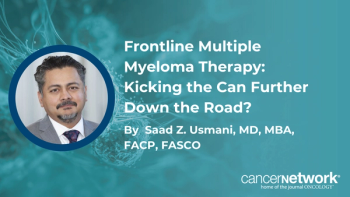
GnRH Agonist May Protect Ovaries During Early Breast Cancer Treatment
Treatment with the gonadotropin-releasing hormone (GnRH) agonist goserelin can reduce the risk of chemotherapy-induced premature ovarian insufficiency (POI) in women with early breast cancer.
Treatment with the gonadotropin-releasing hormone (GnRH) agonist goserelin can reduce the risk of chemotherapy-induced premature ovarian insufficiency (POI) in women with early breast cancer, according to a prospective, randomized trial.
“Ovarian toxicity from chemotherapy is important in younger women, as it may result in loss of fertility and early menopause… with consequent increased risk of a range of adverse health effects including menopausal symptoms, osteoporosis, sexual dysfunction, cardiovascular disease, and loss of neurological function,” wrote study authors led by Robert C. Leonard, MBBS, FRCP, of Charing Cross Hospital in London.
Previous work has suggested GnRH agonists might counteract the effects of chemotherapy, but prospective, randomized data has been mixed. The new study randomized 227 women with early breast cancer to either chemotherapy alone (118 evaluable patients) or to chemotherapy plus goserelin (103 evaluable patients). A further 19 patients (11 in the control group and 8 in the intervention group) did not have menstrual status data available and were excluded, leaving 202 total patients.
The results were
The GnRH agonist reduced the prevalence of amenorrhea compared with chemotherapy alone. Between 12 and 24 months, 22% of those who received goserelin and 38% of those who did not had amenorrhea (P = .015). The prevalence of POI, defined as the presence of amenorrhea with elevated follicle-stimulating hormone (FSH) levels (above 25 IU/L) was also reduced, from 34.8% in the control group to 18.5% in those receiving goserelin (P = .048).
The researchers also stratified the cohort by age, using a cutoff of 40 years; 55% of the control group and 63% of the intervention group were 40 years or under. The protective effect of goserelin was clear in those 40 years or younger (POI: 2.6% vs 20.0%; P = .038), but it was not statistically significant in those over 40 years of age.
In an effort to find a predictive biomarker for this treatment, the researchers conducted a regression analysis to find factors associated with amenorrhea. Pretreatment with anti-Müllerian hormone was a significant predictor of post-treatment amenorrhea, with an odds ratio of 0.43 (95% CI, 0.23–0.80; P = .01), but after adjustment for age this was no longer significant.
“Our results demonstrate that the use of the GnRH analog goserelin provides some protection of ovarian function during chemotherapy for early breast cancer,” the authors concluded, adding that this benefit only may exist in younger women. “The mechanism whereby GnRH analogs might provide ovarian protection is unclear.”
Newsletter
Stay up to date on recent advances in the multidisciplinary approach to cancer.






































